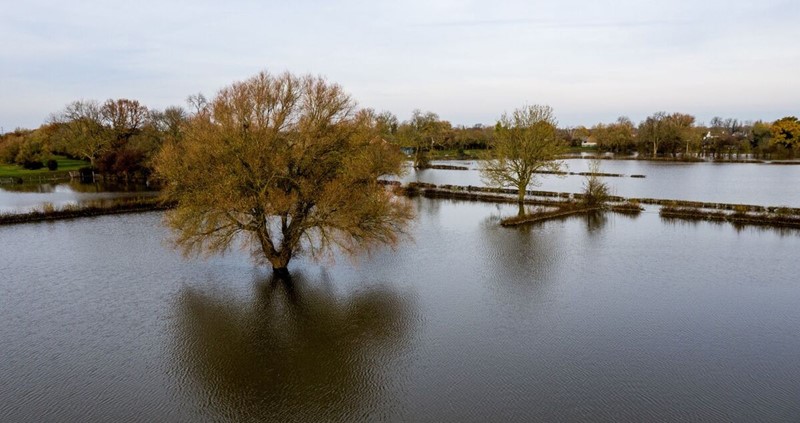As more heavy rain is forecast this week and river levels still to peak in some areas, the NFU said a comprehensive water management strategy was urgently needed to improve flood resilience, including adequate investment, so Britain’s farmers and growers can continue producing the nation’s food.
In a double whammy, many farmers are now seeing next year’s crops rotting underwater after a devastatingly wet 2023 harvest which was the most expensive crop ever grown due to inflation and saw yields tumble.
Ahead of visiting farms in the Midlands and the North, NFU Deputy President Tom Bradshaw said: “We are seeing desperate scenes across the country with many areas experiencing devastating flooding. Sadly, lives have been lost and our thoughts are with those families affected.
“The farming community too has been impacted with hundreds of acres of productive farmland under water and land that’s now inaccessible. We’re hearing desperate stories from many of our members who are struggling to get crops out of the ground from this season or are still to plant autumn crops for next year. Those crops that are in the ground are likely to rot meaning the output and profitability of next year’s harvest is already seriously compromised, building on an unprecedented year in terms of weather and cost. This really is a perfect storm with farmers and growers now facing further financial burdens at a time when on-farm costs are already running high and government support payments are being phased out.
“Despite what we’ve heard from government in recent times about the importance of UK food security, this just isn’t being reflected in policies on how the nation’s food production is valued, and how water infrastructure is managed.
“Farming is on the front line of climate change and the sector is experiencing volatility and severe weather events more often. It’s why we absolutely need a long-term plan to improve how we manage water in times of flood and drought, as we regularly experience both on an annual basis, and both severely impact our ability to produce food.
“A comprehensive water management strategy should set out how we can collaborate better with government, as well as local authorities, water companies and Environment Agency; one that allows farmers and growers to be part of the solution and take on-farm action. A strategy that prioritises food security recognising that domestic food production is part of the critical national infrastructure.
“Central to this will be significant investment with ambitious upgrades of ageing rural flood defences, drainage and waterways as well as regular maintenance. We also need to look at where farming protects adjacent urban areas by absorbing and holding flood water at personal cost to the farms themselves. These businesses must be reimbursed for the public goods being provided on the back of government decisions made.
“A serious commitment by government and regulatory authorities to plan, upgrade and invest in the nation’s water management and infrastructure will have benefits for everyone, including our farmers and growers, so they are able to continue producing climate-friendly sustainable food.”
-ends-
Notes to editor:
- The NFU believes that an integrated water management strategyshould be developed which gives farmers and growers a central role in the better management of land to improve water quality and the better management of water to tackle the dual challenges of floods and droughts – while enabling them to keep feeding the nation.
